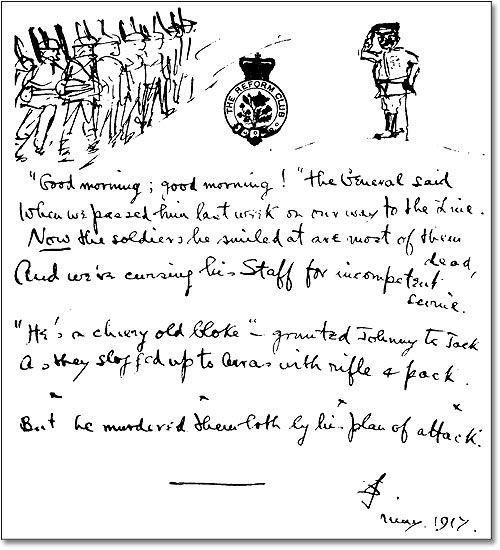
NOTES
A General breezily greets a company of his men as they move up the line towards Arras. His incompetent planning will lead to their deaths.
The General: Pointedly anonymous in the poem. The General is a figurehead for the kind of planning that led to massive loss of life during the attritional warfare on the Western Front– Arras being a particularly grim example of the human cost of the war. The Second Battle of Arras was a diversionary battle that took place in April-May 1917 and was intended to draw strength away from a larger French offensive to the south at Aisne. While very successful at first, gaining ground and employing innovative new tactics, by the end of the offensive such advantage had been largely lost and over 150,000 British and Commonwealth soldiers were dead.
STRUCTURE: ‘The General’ is written with a distinctive and upbeat rhythm that reflects the General’s manner and which ironically contrasts with the deaths that result from his incompetence. This rhythm is anapaestic. An anapaest is a three syllable foot that comprises of two unstressed syllables followed by one stressed syllable. So, for example, the word ‘anapaest’ is, in fact, anapaestic, as we see here: a-na-PAEST. An anapaestic rhythm bounds and gallops forwards, with that third syllable in every foot being accentuated. There are four feet in every line of ‘The General’, meaning that this meter is known as ‘Anapaestic Tetrameter’. If we break down the rhythm in this way (an act known as scansion) then we can follow this rhythm. The second line scans, for example, like this: “When we MET / him last WEEK / on our WAY / to the LINE / ”. It is a strong, striding, strident rhythm, suitable for a poem such as this.
“‘Good-morning; good-morning!’ the General said’”: the breeziness of the General and his pleasant demeanor is used as a powerful contrast to the consequences of his actions. Sassoon’s satirical representation of the General is clever: it suggests (perhaps unfairly) that his upbeat nature somehow reflects a lack of seriousness with which he takes his charge.
“on our way to the line.”: the soldiers are making their way to the front.
“most of ’em dead”: the inverted comma signifies the lower-class accent of the speaker and dropping of the ‘th’ sound. This class voice gives the poem a more subversive tone. The consequences of the cheery General’s actions are devastating.
“And we’re cursing his staff for incompetent swine”: the representatives of the General staff— those soldiers working administratively at the General’s command— were often intensely disliked by the average soldier. Here, their incompetence disgusts the soldiers.
“‘He’s a cheery old card,’ grunted Harry to Jack”: the soldiers see the General as a ‘card’, or ‘character’. Their tone is generous, given the physical effort they are making (“grunted”). The names of the soldiers are common and denote that they are ‘typical’ Tommies. This is, obviously, an emotive move: the irony of the men’s appreciative statement shortly becomes clear.
“slogged up to Arras”: The Battle of Arras, April-May 1917 (see above).
“But he did for them both by his plan of attack.”: the single, end-stopped line at the end of the poem is dramatic, and is the pointed lesson of this poem: that the General and his staff are responsible for the death of the men.
[ANTHOLOGY NOTE: This must be the most effective condemnation of the General Staff written during the First World War. Sassoon and Graves experienced firsthand the poor planning of the General Staff at the front; in Chapter 15 of Goodbye to All That, Graves’ memoir of the war, one particularly memorable fiasco is the La Bassee offensive of August 1915, where the Royal Welch were gassed by their own side.]

A very interesting read! Love the cartoon – where did you get it?
I don’t quite understand this poem; is Siegfried trying to get across his point of disgust towards the General or the naivety of the soldiers?
The scorn of this poem is wholly aimed at the General and his staff.
The General’s ‘breeziness and pleasant demeanor’ in line one may not reflect that he lacks seriousness but simply that he is out of touch with the new reality of 20th Century warfare.
Robert Graves: ‘Sergeant-Major Money’ – ‘least of all blame Money, an old stiff surviving/ In a New (bloody) Army he couldn’t understand’.
Appreciating the persistence you put into your blog and in depth information you present.
It’s nice to come across a blog every once in a while that isn’t the same out of date rehashed material.
Excellent read! I’ve bookmarked your site and I’m adding your RSS feeds to my Google account.
Why was the poem written?
what do you mean by subversive tone
dont worry about the comment now i have managed to actually do the homework now !!!!!!!
Oh, thank goodness!
Without wanting to sound snippy, Laura, the thing to do here is to consult a dictionary. They’re amazing inventions and are, I believe, the next big thing.
Very nice blogpost. If you don’t mind, I used some of it (including the print) in an essay of mine about British poetry during the First World War. Thank you!
You are welcome. I hope you did well.